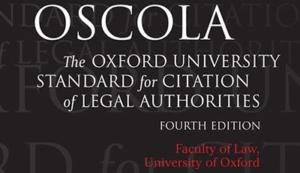Sometimes OSCOLA referencing is referred to as Oxford referencing. OSCOLA uses footnotes, and at the end of the document, requires a bibliography. OSCOLA requirements can be tricky if you’re not familiar with them, but here’s a quick introduction to some general guidelines:
- Punctuation in citations is minimal – for instance, no periods after initials
- Book titles and case names are italicized
- Quotations longer than 3 lines should be block quotes with no quotation marks
- If a citation is the same as the citation directly before it, it can be marked as ibid
- The bibliography should be split into 3 main sections: table of legislation, table of cases, bibliography of secondary sources
- Technically, OSCOLA says that shorter sources like articles and essays typically only require footnotes, but it’s worth checking with your school or program about this for their preferences, as well. When in doubt, include them in the bibliography.
While OSCOLA has guidelines for a variety of citations, including cases, journals and books, parliamentary reports, and legislation, other guidelines are not included. On the OSCOLA website, there are guidelines for sources “not specifically referred to” in the 4th edition, although they haven’t been reviewed by the editorial board yet. These sources include ebooks, book reviews, judgments citing other judgments, podcasts, and others.
Resources
Quick Reference Guide to OSCOLA
OSCOLA for EndNote, RefWorks, and others
Formatting can be complicated and confusing, as well as time-consuming. We know your time is limited when you're researching and writing your dissertation, on top of work and family obligations. Let us help you with formatting your dissertation or major paper! Our team consists of highly experienced editors who are trained in a variety of formatting styles and can ensure that your paper meets the standards set forth by your program. Contact us today to see how we can help you!
< Self-Care During COVID-19 EndNote: An Introduction >
